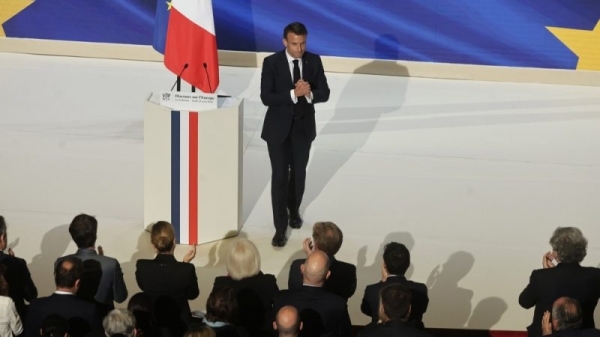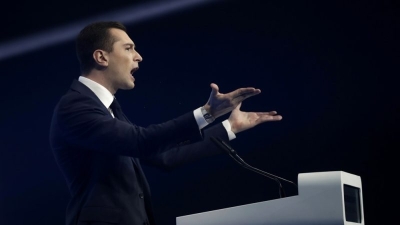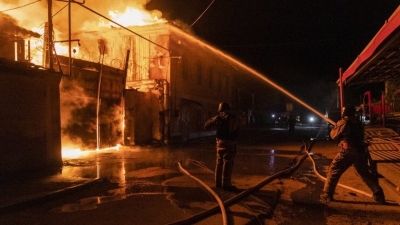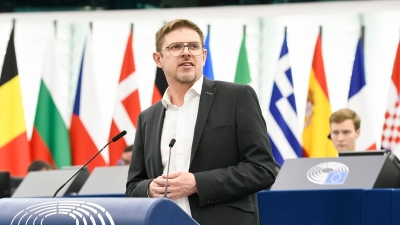Europe is ‘mortal’, Macron warns in Sorbonne speech

French President Emmanuel Macron delivered his much-awaited speech on the future of the European Union at the Sorbonne University on Thursday (25 April), insisting that ‘our Europe is mortal’.
Read the original French story here.
“It can die or find itself relegated,” he said during his speech, stressing several times that the international rules of the game had “changed” and that the continent was in danger of being “encircled”, pointing to a “risk of being left behind” over the next decade.
Despite “some historic steps forward”, such as the decision by EU countries to engage in joint borrowing at the height of the pandemic and the acceptance by Brussels of the principle of European sovereignty, “clarity and honesty” lead us to recognise that “the battle is not yet won, far from it”.
The French president addressed a crowd of 500 people, including most of the government ministers, as well as French Internal Market Commissioner Thierry Breton, former Prime Minister Elisabeth Borne and the leader of the Democratic Movement (MoDem, Renew), François Bayrou.
For almost two hours, Macron spoke at length about the three elements necessary for Europe’s survival: “power, prosperity and humanism”.

Europeans locked in Patriot games as Ukraine pleads for more air defence
EU member states are increasingly under pressure to provide Ukraine with urgently needed advanced air defence systems, but efforts are bogged down in national security considerations.
Getting rid of US reliance
Regarding security, the French president proposed building a “strategic concept for a credible European defence” in the face of external threats from Russia and Iran and at a time when the US was looking to China and the Pacific.
Europe is no longer a priority for Washington,” he warned, calling on the bloc to continue its rearmament efforts to ensure some EU countries no longer rely on the United States for their security.
In his speech, Macron also reiterated his support for the rapid development of the bloc’s defence industry, highlighting France’s capabilities in this area and the recent high sales of the French Rafale fighter jets, adding that France could also benefit from a joint loan that would favour the purchase of defence equipment ‘made in Europe’.
At the same time, Macron also called for greater ‘strategic intimacy’ between the armies of all EU countries, without specifically referring to the creation of a European army – an idea that right-wing and far-right MEPs have lambasted – and the establishment of a joint military academy, to make Europe a “balancing power” in a troubled world.
Border control and EU enlargement
Eager to address one of the most hotly debated issues of the EU election campaign, Macron also spoke of the measures contained in the EU’s Asylum and Migration Pact, which the European Parliament painstakingly adopted two weeks ago.
According to him, the EU must “regain control of its borders” though the outsourcing of the management of asylum seekers to third countries, as the United Kingdom plans to do in Rwanda or Italy in Albania, is not something that should be envisaged.
In his speech, he said he preferred the European Commission’s approach, which consists of signing agreements with certain countries to limit migrant departures and facilitate returns.
On enlargement, Macron was brief, mentioning only that Moldova, Ukraine and the Western Balkans had a “vocation” to join the EU – a reference to a term used at the 2003 Thessaloniki European Council that is unlikely to reassure candidate countries.
Unlike in his 2017 Sorbonne speech and Conference on the Future of Europe speech of 2022, Macron did not mention the issue of EU treaty reform, simply acknowledging that “we have not achieved everything”.

Von der Leyen to seek third-country migration deals during Hungary’s EU Council presidency
The much-controversial steady deployment of partnerships with countries of origin and transit is next in the EU leaders’ plan to reduce migration influxes, now that the European Parliament has ratified a large-scale reform on how the bloc will deal with migrants internally.
Campaign speech?
Accused by all the opposition parties of interfering in the electoral campaign, and with Renaissance candidate Valérie Hayer languishing at 17% of the vote, the president was careful not to mention the forthcoming European elections.
However, he accused the far-right parties, without naming them, of wanting to remain in the European “building” without “paying the rent” or respecting the “rules of co-ownership”. After Brexit, “nobody dares to propose exits, neither from Europe nor from the euro”, he noted before calling for a “European humanism”.
“To be European is not simply to live in a land that stretches from the Baltic to the Mediterranean, or from the Atlantic to the Black Sea; it is to defend a certain idea of man that places the free, rational and enlightened individual above all else,” he declared, urging Europeans not to doubt themselves.
Understandably, his political opponents reacted harshly to the president’s speech. François-Xavier Bellamy, head of the right-wing Les Républicains list for the European elections, told France Info that “the president talks a lot but […] produces very few results”.
Manon Aubry, who heads the EU list of the radical left party La France Insoumise, told X that “Macron defends a Europe of profiteers, war, free trade and austerity”.
At a political meeting in Strasbourg the day before, Socialist candidate Raphaël Glucksmann quoted Hamlet to describe the president’s speech – even before he had heard it: “Words, words, words”.
On the side of the far-right Rassemblement National (RN) that is currently crushing it in the polls with over 30% support, its leader, Jordan Bardella, explained his party’s programme before supporters at his party’s headquarters the same day.

Macron at Sorbonne: Energy key to French president’s ‘new European paradigm’
French President Emmanuel Macron set out his vision for the future of Europe, placing energy, including nuclear, at the core of his approach, in a speech at Sorbonne University on Thursday (April 25).
Read more with Euractiv




